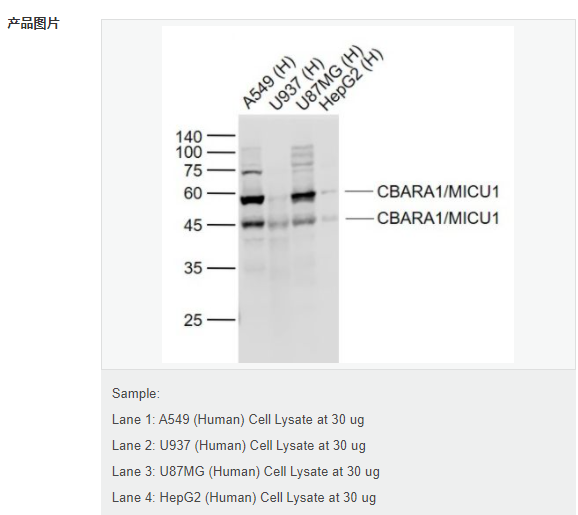
货号
产品规格
售价
备注
BN42015M-50ul
50ul
¥1486.00
交叉反应:Human(predicted:Mouse,Rat) 推荐应用:WB
BN42015M-100ul
100ul
¥2360.00
交叉反应:Human(predicted:Mouse,Rat) 推荐应用:WB
| 英文名称 | CBARA1/MICU1 |
| 中文名称 | 线粒体钙吸收蛋白单克隆抗体 |
| 别 名 | Mitochondrial Calcium Uptake 1; Calcium-Binding Atopy-Related Autoantigen 1; Atopy-Related Autoantigen CALC; Ara CALC; CBARA1; CALC; Calcium Binding Atopy-Related Autoantigen 1; Calcium Uptake Protein 1, Mitochondrial; Allergen Hom S 4; EFHA3; MPXPS; MICU1_HUMAN; |
| 研究领域 | 细胞生物 信号转导 新陈代谢 线粒体 |
| 抗体来源 | Mouse |
| 克隆类型 | Monoclonal |
| 克 隆 号 | 1H8 |
| 交叉反应 | Human, (predicted: Mouse, Rat, ) |
| 产品应用 | WB=1:500-1000 not yet tested in other applications. optimal dilutions/concentrations should be determined by the end user. |
| 分 子 量 | 54kDa |
| 细胞定位 | 细胞浆 线粒体 |
| 性 状 | Liquid |
| 浓 度 | 1mg/ml |
| 免 疫 原 | Recombinant human CBARA1 Protein (1-250/476): |
| 亚 型 | IgG |
| 纯化方法 | affinity purified by Protein G |
| 储 存 液 | 0.01M TBS(pH7.4) with 1% BSA, 0.03% Proclin300 and 50% Glycerol. |
| 保存条件 | Shipped at 4℃. Store at -20 °C for one year. Avoid repeated freeze/thaw cycles. |
| PubMed | PubMed |
| 产品介绍 | This gene encodes an essential regulator of mitochondrial Ca2+ uptake under basal conditions. The encoded protein interacts with the mitochondrial calcium uniporter, a mitochondrial inner membrane Ca2+ channel, and is essential in preventing mitochondrial Ca2+ overload, which can cause excessive production of reactive oxygen species and cell stress. Alternatively spliced transcript variants encoding different isoforms have been described. [provided by RefSeq, Mar 2013] Function: Key regulator of mitochondrial calcium uniporter (MCU) that senses calcium level via its EF-hand domains (PubMed:20693986, PubMed:23101630, PubMed:23747253, PubMed:24313810, PubMed:24332854, PubMed:24503055, PubMed:24560927, PubMed:26341627, PubMed:26903221, PubMed:27099988). MICU1 and MICU2 form a disulfide-linked heterodimer that stimulates and inhibits MCU activity, depending on the concentration of calcium. MICU1 acts both as an activator or inhibitor of mitochondrial calcium uptake (PubMed:26903221). Acts as a gatekeeper of MCU at low concentration of calcium, preventing channel opening (PubMed:26903221). Enhances MCU opening at high calcium concentration, allowing a rapid response of mitochondria to calcium signals generated in the cytoplasm (PubMed:24560927, PubMed:26903221). Regulates glucose-dependent insulin secretion in pancreatic beta-cells by regulating mitochondrial calcium uptake (PubMed:22904319). Induces T-helper 1-mediated autoreactivity, which is accompanied by the release of IFNG (PubMed:16002733). Subunit: Homohexamer; in absence of calcium (PubMed:24514027). Forms a homohexamer in absence of calcium and rearranges into a heterodimer in presence of calcium (PubMed:26489515, PubMed:24514027). Heterodimer; disulfide-linked; heterodimerizes with MICU2 (PubMed:24560927). The heterodimer formed with MICU2 associates with MCU at low calcium concentration and dissociates from MCU at high calcium level (PubMed:26387864). Component of the uniplex complex, composed of MCU, MCUB, MICU1, MICU2 and EMRE/SMDT1 (PubMed:24231807). Interacts (via polybasic region) with EMRE/SMDT1; the interaction is direct (PubMed:27099988). Interacts (via polybasic region) with MCU (via coiled coil domains); the interaction is direct and precedes formation of the heterodimer with MICU2 (PubMed:21685886, PubMed:23101630, PubMed:23178883, PubMed:24332854, PubMed:26387864). Interacts with SLC25A23 (PubMed:24430870). Interacts with CHCHD4/MIA40; which introduces the interchain disulfide bond with MICU2 (PubMed:26387864). Subcellular Location: Mitochondrion inner membrane; Single-pass membrane protein; Mitochondrion intermembrane space Tissue Specificity: Expressed in epithelial cell lines. Strongly expressed in epidermal keratinocytes and dermal endothelial cells. Similarity: Belongs to the MICU1 family. MICU1 subfamily. Contains 2 EF-hand domains. SWISS: Q9BPX6 Gene ID: 10367 Database links: Entrez Gene: 10367 Human Entrez Gene: 216001 Mouse Omim: 605084 Human SwissProt: Q9BPX6 Human SwissProt: Q8VCX5 Mouse Unigene: 524367 Human Unigene: 27199 Mouse Unigene: 214252 Rat Important Note: This product as supplied is intended for research use only, not for use in human, therapeutic or diagnostic applications. |
